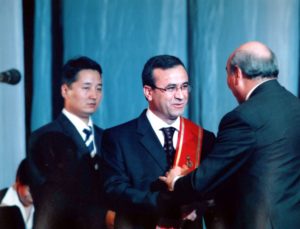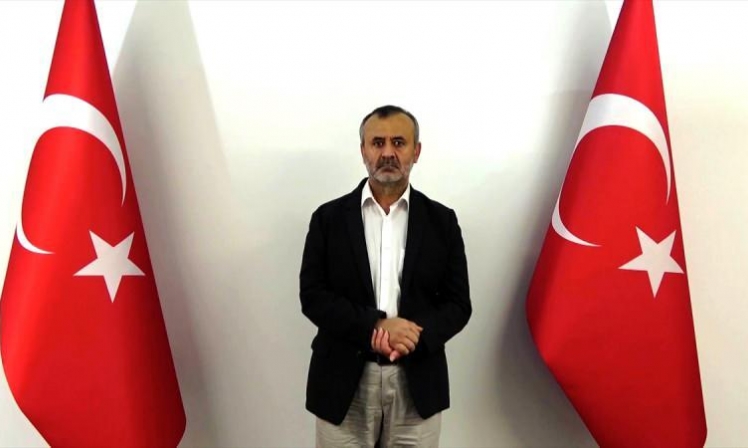Educator Orhan İnandı, a dual Turkish-Kyrgyz national who was abducted by Turkish intelligence agency MIT, was questioned about subscriptions to newspapers and magazines critical of the government after he was taken to Turkey, according to a document obtained by Nordic Monitor.
İnandı, the founder and president of the prestigious Turkish-Kyrgyz Sapat school network operating in Kyrgyzstan, was kidnapped by Turkish spies on May 31, 2021 and illegally brought to Turkey, where he is believed to have been subjected to torture.
The educator, who had been living in Kyrgyzstan for nearly three decades, was targeted because of his links to the Gülen movement, a group that is critical of the government of Turkish President Recep Tayyip Erdoğan on a range of issues including pervasive corruption and Turkey’s arming of jihadist groups.
“Are there any newspapers or magazines you subscribe to? If you have a subscriptions to these newspapers and magazines, when and how long did you subscribe and how much did you pay for the subscriptions? Explain,” the police asked according to an 89-page statement that was taken July 10-12, 2021 at the Ankara counterterrorism department.
İnandı said he was a subscriber to a magazine called Sızıntı, at one time Turkey’s highest-circulating monthly magazine which had been in publication since the 1970s until the Erdoğan government unlawfully seized the Kaynak publishing house in 2015 and shut down the magazine a year later along with some 200 media outlets in an unprecedented crackdown on the critical and independent media.
The Turkish government considers reading and subscribing to critical and opposition dailies and publications evidence of a crime and treats any association with such publications sufficient to warrant a criminal probe under the country’s much-abused anti-terror laws. Many people were arrested and sent to jail merely because of their subscriptions to publications that are associated with the Gülen movement including the Zaman daily, once the country’s most highly circulated newspaper until it was unlawfully taken over by the Erdoğan government in March 2016.
The subscription to Sızıntı that İnandı had referred to his statement is more than enough to convict and sentence him to prison in Turkey, where the government has been waging a war against critical, independent and opposition media outlets. The Erdoğan government jailed nearly 200 journalists, making Turkey the number-one jailer of journalists in the world, according to the Stockholm Center for Freedom, a Swedish-based monitoring group.
Sızıntı had been the most widely read Turkish culture, science, and religion magazine with 850,000 monthly subscribers until it was taken over by the government in 2015. Subscriptions dropped dramatically in 2016 after a reader backlash, and the government decided to shut it down altogether in July 2016.

Sızıntı first came out in 1979 with a copy of Italian artist Bruno Amadio’s famous painting, “The Crying Boy,” and mostly covered the subjects of culture, literature, health, science, history and religion. It was not a political magazine. The magazine was also published in English, German, Russian, Arabic and Albanian and could be found in 42 counties around the world.
İnandı was subscriber in 1995 when he was in Kyrgyzstan, where he helped bring investors from Turkey and other countries to invest millions of dollars in the country’s educational institutions. He was recognized by the state multiple times for his contributions to improving the school system in the country.

In his statement, İnandı talked about the schools where he had spent his entire career in the 26 years he had lived in Kyrgyzstan. The schools have been popular with many senior government officials, with presidents and prime ministers opting to send their children and grandchildren to Sapat schools.
Some 20,000 students have so far graduated from the Sapat schools, managed by the Ministry of Education. It currently has 11,000 students enrolled in various grades and has a teaching staff of 1,000 and technical personal of some 1,200. Some 90 percent of the teaching staff comprises Kyrgyz nationals, while the reminder are Turkish, American, Canadian, British, Indian and Philippine nationals, according to İnandı’s statement.
He denied accusations that he belonged to a terrorist group and said he has never been involved in any illegal business in his entire life. Starting his career as a history teacher in 1991 and serving in some managerial positions in educational institutions in Turkey, İnandı moved to Kyrgyzstan in 1995, after which he was offered a position as deputy principal in the Sapat schools. Marrying his wife Reyhan the same year, the couple has four children who still live in Kyrgyzstan.
Kyrgyzstan called on Turkey to return İnandı, and Ahmet Sadık Doğan, the Turkish ambassador in Bishkek, was summoned by Kyrgyz Foreign Minister Ruslan Kazakbaev upon an order from President Sadyr Japarov. Doğan was handed an official note of protest denouncing the abduction of İnandı.
The Kyrgyz authorities made clear to Turkey that such an action was unacceptable and violates the principles and norms of international law, human rights and freedoms enshrined in the Universal Declaration of Human Rights and the International Covenant on Civil and Political Rights.
Although the Turkish ambassador was silent as to how educator was abducted, President Erdoğan publicly admitted that İnandı was abducted by Turkish spies and brought to Turkey, praising their efforts in the rendition. Photos of İnandı in handcuffs with Turkish flags indicated İnandı had lost weight and apparently had been subjected to torture. İnandı’s wife, Reyhan, said the photos showing her husband in handcuffs exposed the torture he had undergone. “It’s obvious they tortured my husband. He has lost so much weight,” she said.
The Turkish actions abroad sparked criticism and outrage. In a joint letter UN rapporteurs accused the Turkish government of engaging in the systematic practice of state-sponsored extraterritorial abductions and forcible returns to Turkey, with at least 100 Turkish nationals from multiple states including Afghanistan, Albania, Azerbaijan, Afghanistan, Cambodia, Gabon, Kosovo, Kazakhstan, Lebanon and Pakistan removed to Turkey.
In a number of cases the UN Working Group on Arbitrary Detention (WGAD) concluded that the arrest, detention and forced transfer to Turkey of Turkish nationals were arbitrary and in violation of international human rights norms and standards.
A recent report by Freedom House on global transnational repression also revealed the intensity, geographic reach and suddenness of the Turkish government’s campaign targeting dissidents abroad, noting that Turkey has become number one among countries that have conducted renditions from host states since 2014.
According to recent official statements by its interior ministry, Turkey has sent 800 extradition requests to 105 countries since the attempt, and more than 110 alleged members of the movement have been brought back to Turkey as part of the government’s global campaign.




